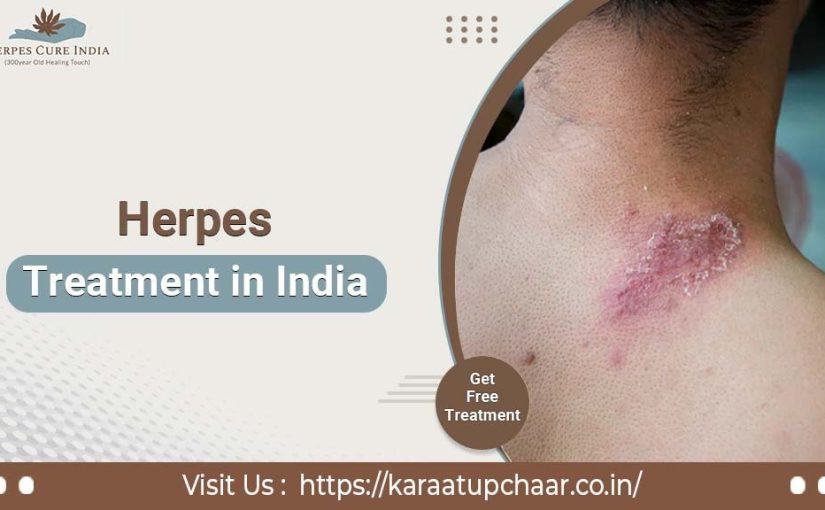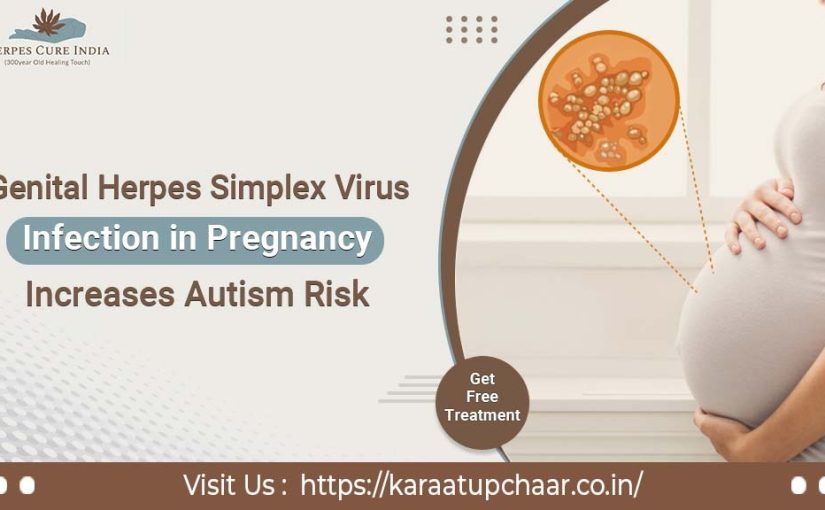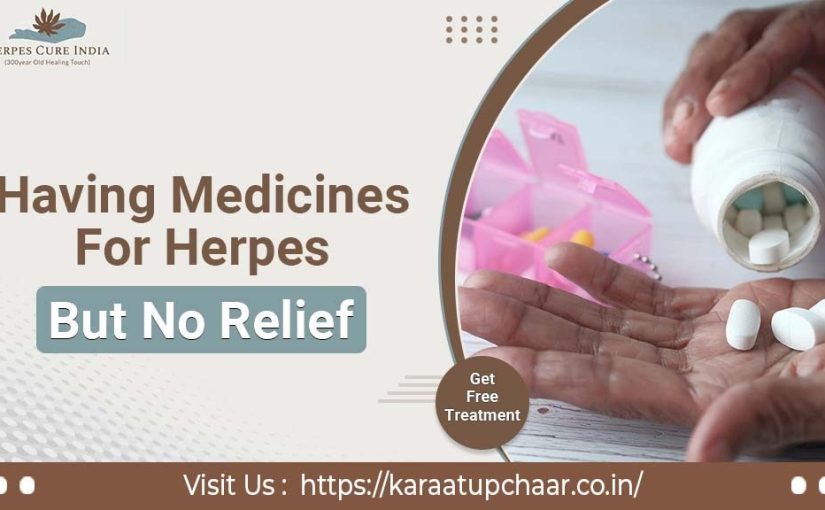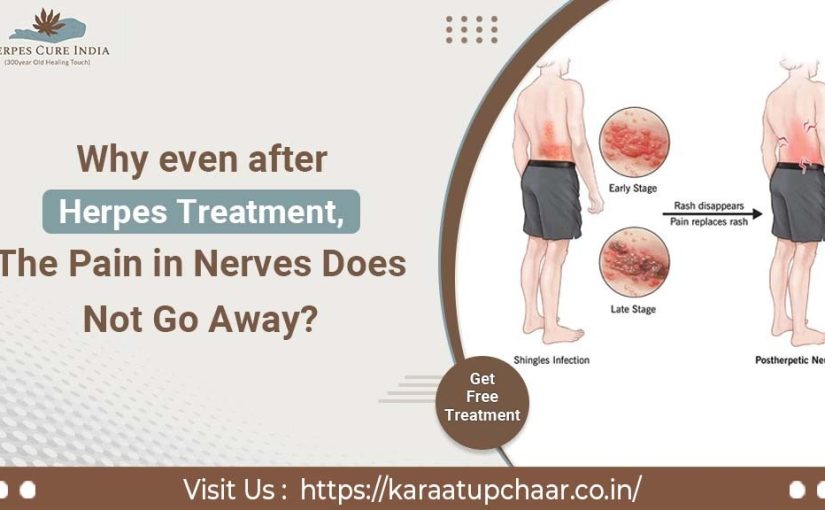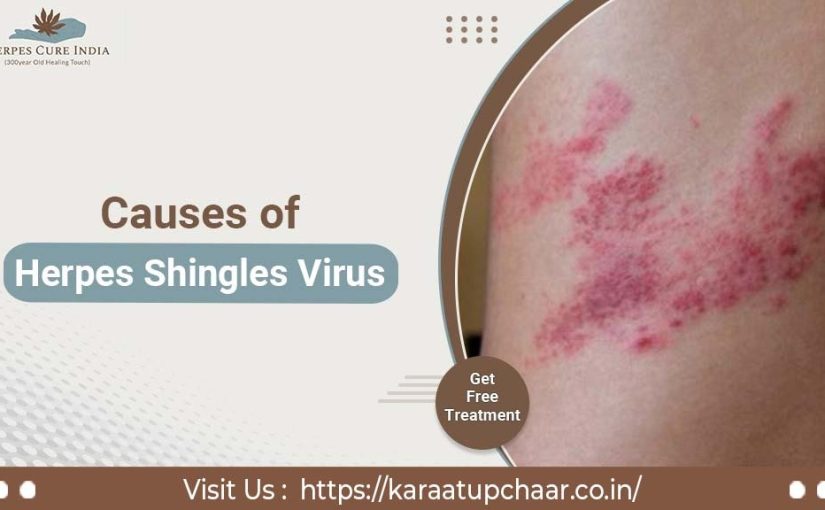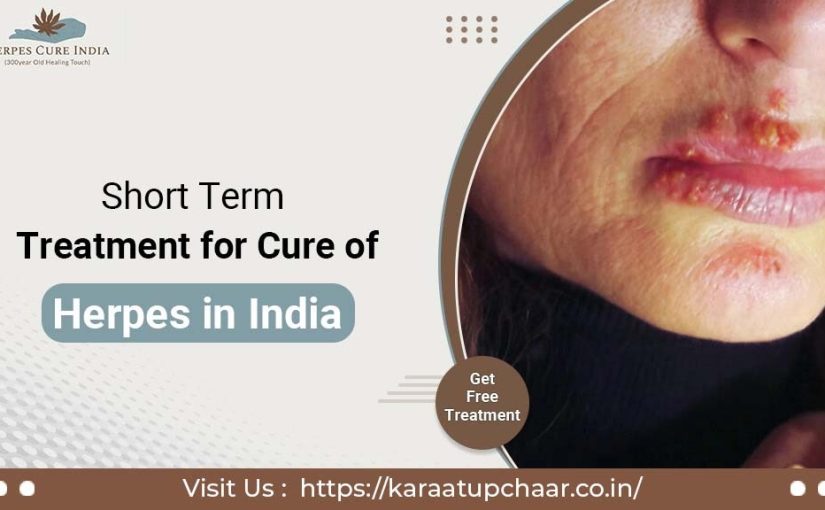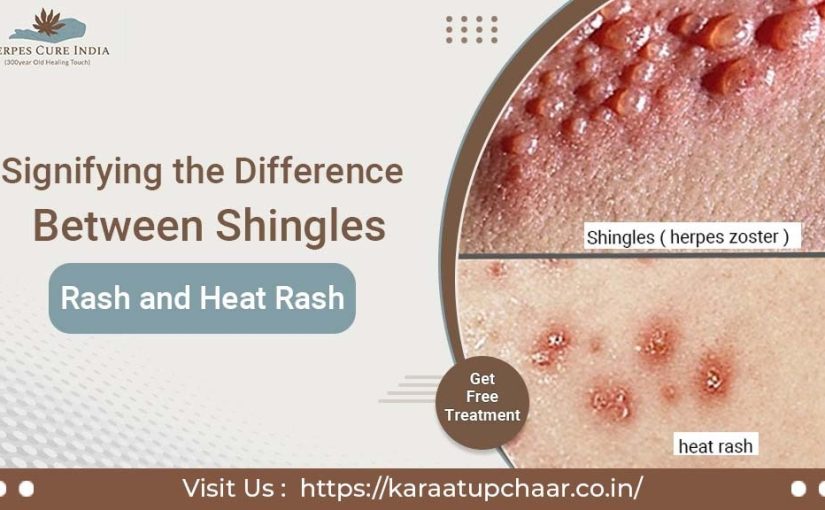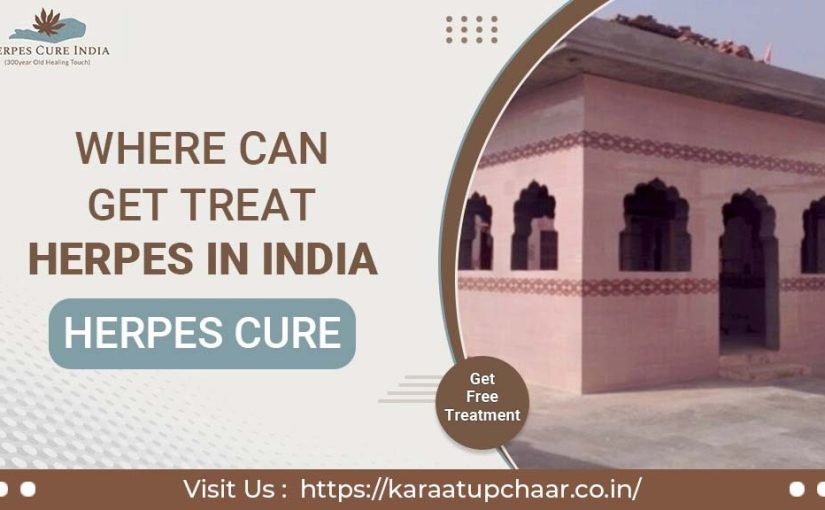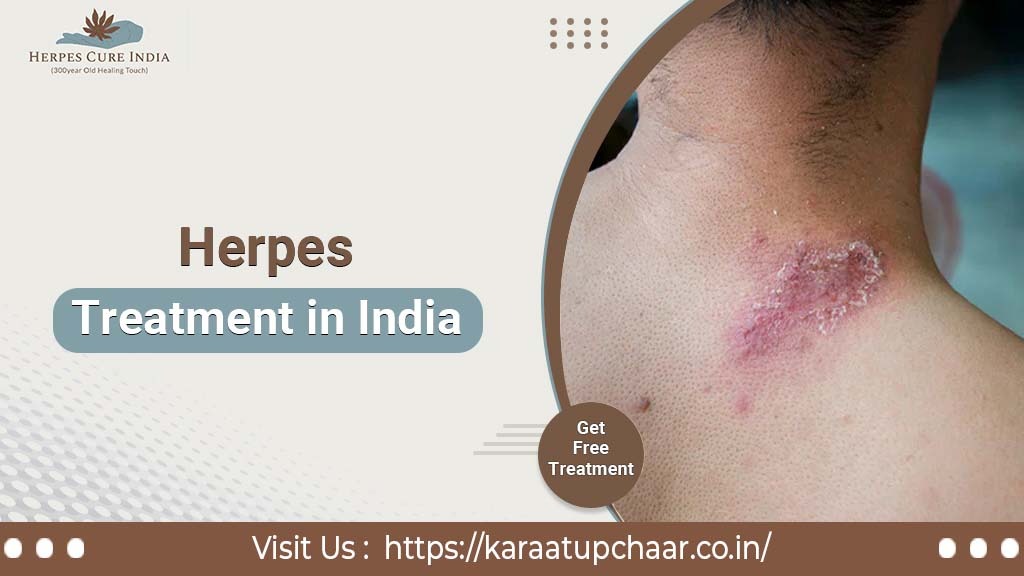
Free Herpes Treatment in India – Ayurvedic Cure for Herpes
Herpes is a common viral infection caused by the herpes simplex virus (HSV), which manifests in the form of blisters or sores around the mouth or genital areas. While there is no definitive cure for herpes, certain Ayurvedic treatments and herbal remedies can help manage the symptoms and reduce the frequency of outbreaks. This blog explores the available options for free herpes treatment in India, focusing on the Ayurvedic approach to managing this condition.
Comprehensive Guide to Free Herpes Treatment in India
If you are searching for a cure for herpes simplex, Ayurvedic treatments offer a natural and effective way to manage the symptoms of the virus. The herpes simplex virus can cause painful blisters or sores, and while some individuals may not show symptoms, the virus remains highly contagious. The traditional approach to managing herpes includes antiviral medications, but Ayurvedic medicine offers an alternative that is natural and often without adverse side effects.
Why Choose Ayurvedic Cure for Herpes Simplex?
Ayurveda, the ancient Indian system of medicine, utilizes natural herbs and oils to treat various ailments, including herpes. Ayurvedic herpes treatment in India focuses on relieving pain and managing the symptoms using natural methods such as herbal oils, creams, and other remedies. Unlike conventional treatments, Ayurvedic methods are gentle on the body and aim to treat the root cause of the problem.
Free Herpes Treatment Options in India
We are offering a range of free Ayurvedic treatments for herpes in India, including oils, herbs, and other topical applications. These treatments can help reduce itching, pain, and discomfort associated with herpes outbreaks. Our products are homemade, crafted using traditional Ayurvedic methods, and are designed to be safe and effective for long-term use.
Use the Following Oils for Free Herpes Treatment in India:
– Essential Oils: Tea tree, chamomile, ginger, thyme, and eucalyptus oils are known for their antiviral properties and can be used to soothe herpes sores.
– Neem Extract: Neem is a powerful antiviral herb that can help reduce the severity of herpes symptoms.
– Lemon Balm Extract: This is another effective herb that can be used in various forms, such as plant extract or essential oil.
– Witch Hazel: Known for its astringent properties, witch hazel can help dry out herpes sores and reduce inflammation.
Other natural remedies that do not require dilution include aloe vera, manuka honey, licorice extract, and echinacea extract. These can be applied directly to the affected area to promote healing.
How to Perform a Patch Test
Before using any topical treatment for herpes, it is essential to conduct a patch test to ensure that the substance does not cause irritation:
1. Apply a small amount of the treatment to your forearm.
2. Wait for 24 hours.
3. If the area becomes red, itchy, or swollen, wash it off immediately and discontinue use.
4. If no irritation occurs, the treatment can be safely applied to the affected area.
Frequently Asked Questions (FAQ) For Free Herpes Treatment in India
Q: What is the free treatment for Herpes?
A: While there is no definitive cure for herpes, antiviral medications and Ayurvedic treatments can help reduce the severity and frequency of outbreaks.
Q: Can herpes be cured in India?
A: There is currently no cure for herpes, but with proper treatment and management, individuals can reduce the frequency and severity of outbreaks.
Q: Can I still have sex if I have herpes?
A: Yes, but it is important to use protection to prevent the transmission of the virus to your partner.
Q: Can herpes be transmitted through physical relationships?
A: Yes, herpes can be transmitted through physical relationships. Both partners should take proper precautions during sex.
Additional Natural Treatments for the Mind and Body
1. Support Groups: Dealing with herpes can be emotionally challenging. Joining a support group can help you cope with the social and emotional impact of the virus.
2. Relaxation Techniques: Practices like yoga, guided imagery, and meditation can help manage stress, which is a known trigger for herpes outbreaks.
3. Self-Hypnosis: Techniques like guided imagery or self-hypnosis have been shown to reduce the frequency of herpes outbreaks and improve mood.
4. Counseling: Individual counseling with a mental health professional can help you manage the emotional aspects of living with herpes.
Conclusion
Herpes simplex virus may not have a definitive cure, but with the right approach, including Ayurvedic treatments and lifestyle adjustments, you can manage the symptoms and reduce the frequency of outbreaks. For those seeking free herpes treatment in India, Ayurvedic remedies offer a natural and effective solution. Remember to always consult with a healthcare professional before starting any new treatment.
For more information and to access free herpes treatments, visit [Herpes Cure](https://karaatupchaar.co.in/) and explore the various options available to help you manage this condition effectively.
Do you have any Questions –
Call Us- 9954064243
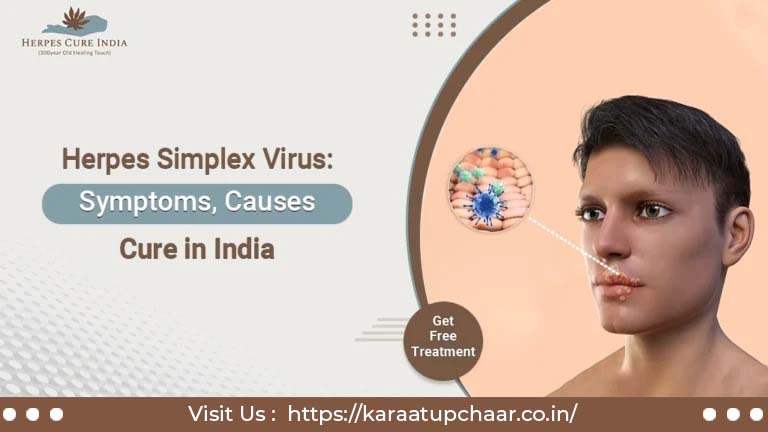
What is the Herpes Simplex Virus?
Herpes is a viral infection caused by the herpes simplex virus. HSV-1 and HSV-2 are two infectious diseases that cause this infection.
HSV1 (Herpes Simplex Virus-1)
HSV2 (Herpes Simplex Virus-2)
What is the Herpes Simplex Virus type 1 (HSV-1)
Herpes simplex virus type 1 (HSV-1) is a common virus that causes cold sores or fever blisters on the lips and mouth, as well as other types of infections. While there is no cure for HSV-1, there are several treatments available to manage symptoms and reduce the frequency and duration of outbreaks
Antiviral medications are often used to treat HSV-1 infections. Some commonly prescribed antiviral medications for HSV-1 include:
Genital infection is also adopted through sexually transmitted infection (STI). It even spreads via direct contact with the infected person’s body. Occasionally, the infected person sometimes does not even show any symptoms of the herpes simplex virus 1 but he or she can infect another person. A child can get infected during birth. The contagion, after infection, gets transported to the whim-whams cell bodies and it remains there idle lifelong.
What is the Herpes Simplex Virus type 2 (HSV-2)
Herpes simplex virus type 2 (HSV-2) is a common virus that is primarily transmitted through sexual contact. It can cause genital herpes, which is a sexually transmitted infection that causes painful sores or blisters on or around the genitals or rectum. While there is no cure for Herpes simplex Virus -2, there are several treatments available to manage symptoms and reduce the frequency and duration of Herpes outbreaks.
Genital infection is also adopted through sexually transmitted infection (STI). It even spreads via direct contact with the infected person’s body. Occasionally, the infected person sometimes does not even show any symptoms of herpes simplex virus 2, but he or she can infect another person. A child can get infected during birth. The contagion, after infection, gets transported to the whim-whams cell bodies and it remains there idle for lifelong
Some common antiviral medications for Herpes simplex virus -2 include:
Acyclovir (Zovirax)
Valacyclovir (Valtrex)
Famciclovir (Famvir)
These medications work by inhibiting the replication of the Herpes simplex virus 2, which can reduce the severity and duration of symptoms and help prevent future outbreaks.
What is the treatment medicine for Herpes simplex virus?
There are several medications available for the treatment of herpes simplex virus (HSV) infections. The specific medication prescribed will depend on the type and location of the infection (i.e., oral or genital), as well as the severity and frequency of outbreaks.
Antiviral medications are commonly used to treat Herpes simplex virus infections. These medications work by stopping the HSV virus from replicating and spreading to new cells. Some commonly prescribed antiviral medications for HSV infections include:
Acyclovir (Zovirax)
Valacyclovir (Valtrex)
Famciclovir (Famvir)
These medications can be taken orally or applied topically (on the skin) in the form of creams or ointments. They are most effective when started early in the course of an outbreak and taken for the full course of treatment as prescribed by a healthcare provider.
It’s important to note that while antiviral medications can help to manage symptoms and reduce the frequency and duration of outbreaks, they do not cure Herpes simplex virus infections. Additionally, these medications may not be appropriate for everyone and can have side effects, so it’s important to discuss any concerns or questions with a healthcare provider.
How to do Hsv-1 treatment?
HSV-1 (Herpes Simplex Virus 1) is a virus that can cause cold sores or fever blisters on the lips or around the mouth. but there are treatments available to help manage symptoms and reduce the frequency and severity of outbreaks.
Here are some options for HSV-1 treatment:
Antiviral medications: These medications can help to reduce the duration and severity of symptoms during an outbreak and can also be taken on a daily basis to help prevent future outbreaks. Examples of antiviral medications commonly used to treat HSV-1 include acyclovir, valacyclovir, and famciclovir.
Topical treatments: Over-the-counter creams and ointments containing numbing agents, such as lidocaine, can help to relieve pain and itching associated with cold sores. Applying a cold, damp cloth to the affected area can also help to soothe the skin.
Avoid getting hit: Outbreaks of herpes simplex virus-1 can be triggered by stress, fatigue, illness, or exposure to sunlight, among other factors. Avoiding these triggers can help to reduce the frequency of outbreaks.
It is important to note that while these HSV-1 treatments can be effective in managing symptoms, there is no cure for HSV-1. If you have symptoms of herpes simplex virus-1 or are concerned that you may have been exposed to the virus, it is important to speak with a healthcare provider for a proper diagnosis and HSV-1 treatment plan.
How to do Hsv-2 treatment?
Herpes simplex virus 2 (HSV-2) commonly causes recurrent infections affecting the skin, mouth, lips, eyes, and genitals. which is a sexually transmitted infection,
We have the best remedy oils for Herpes simplex virus 2 treatments, oils will help manage symptoms and reduce the frequency and severity of outbreaks and give quick relief in (HSV-2)
Common severe infections include encephalitis, meningitis, neonatal herpes, and disseminated infection. Mucocutaneous infections cause clusters of small painful vesicles on an erythematous base. laboratory confirmation by culture, polymerase chain reaction, direct immunofluorescence, or serologic testing can be done. Herpes simplex virus 2 Treatment is symptomatic; antiviral therapy with acyclovir, valacyclovir, or famciclovir is helpful for severe infections and, if begun early, for recurrent or primary infections.
Here are some options for HSV-2 treatment:
Antiviral medications: Antiviral medications can be taken to reduce the duration and severity of herpes simplex virus outbreaks, and may also be taken on a daily basis to reduce the frequency of outbreaks. Examples of antiviral medications commonly used for HSV-2 treatment include acyclovir, valacyclovir, and famciclovir.
Topical HSV-2 treatments: Topical creams and ointments, such as docosanol and lidocaine, can help to reduce pain and itching associated with genital herpes outbreaks.
Symptoms Of Herpes Simplex Virus
In numerous cases, there may not be any visible symptoms for this problem but they can still transmit the infection to other people who may have come in close contact. They remain asymptomatic for months and may appear completely after a time period of infection. Some of the common symptoms are pain during urination, pocks near the mouth and/ or genitals, greenishness, and itching. You may also witness flu-like symptoms like headaches, fever, fatigue, vaginal discharge, red pocks on the skin, blown lymph bumps, and dropped appetite.
Its symptoms most of the time appear around four days after exposure to the body. Herps are easily transmitted and spread forward in other organs of your body. It can lead to herpes keratitis, a condition of infection of the eyes and it causes eye discharge, pain, and a gritty feeling.
Some people have intermittent infections after the original herpes simplex virus infection and its symptoms include cold blisters near the mouth, ulceration or pocks on the cervix in women, burning sensation around the genitals, and red pocks. ultimately, the frequency of the infections becomes lower and the symptoms aren’t severe.
Causes of Herpes Simplex Virus
HSV-1 is mainly spread by oral contact and causes oral herpes (including cold sores), but can also cause genital herpes. HSV-2 is a sexually transmitted infection that causes genital herpes simplex virus.
Herpes Cure in India
There’s no treatment available to cure this viral infection. Croakers define specifics to get relief from the symptoms and to limit the spread of the infection. Antiviral medicines circumscribe the addition of contagion and reduce the symptoms. The symptoms can vanish without any drug but you need to consult your croaker for proper treatment. specifics like valacyclovir and famciclovir are given to cases to lower the chances of an outbreak and reduce the inflexibility of the symptoms.
For there’s no such herpes cure in India, thus you can also try some home remedies to treat the symptoms at ease at home with simple ingredients. Taking bath in interspersed water, abstaining from sexual conditioning, avoiding restrictive clothes, washing hands constantly, and taking painkillers will help you.
Why Is not There a Cure For Herpes?
Unlike other sexually transmitted conditions, like syphilis or gonorrhea, herpes is not caused by bacteria. Rather, herpes simplex virus is a contagion that penetrates specific cells in the body lying dormant for months or times between outbreaks.
In some people, the herpes contagion can develop in the body but remain asymptomatic, meaning they do not ever witness any outbreaks.
Because herpes simplex virus is a contagion, it’s not possible to “kill” a herpes infection completely like a bacterial infection. Cold sore treatments and ways to help fight the HSV- 1 and HSV- 2 contagions pullulate, however, which means herpes does not have to be a life-changing event.
Antiviral medicines can reduce the threat of spreading the contagion and help outbreaks, but the current drugs cannot fully cure the contagion in the way that antibiotics can kill bacteria. Antiviral specifics like valacyclovir are largely effective at treating both oral and genital herpes simplex virus, meaning people with herpes can live normal, problem-free lives.
What is Herpes simplex virus Treatment in India?
There is no cure for the genital herpes simplex virus. However, daily use of oil massage shortens herpes outbreaks.
How does the herpes simplex virus spread?
HSV-1 is mainly transmitted via contact with the virus in sores, saliva, or surfaces in or around the mouth. HSV1 can be transmitted to the genital area through oral-genital contact to cause genital herpes simplex virus.
What HSV-2 treatment is available for herpes?
There is no cure for herpessimplex virus. However, home remedies (daily use of oil massage) can prevent or shorten outbreaks.
What can I do, if I have herpes?
If you have been diagnosed with genital herpes simplex virus and need treatment for an outbreak. Then go to home remedies. Ramesh Ji from herpes cure treats herpes simplex virus free of cost. With this treatment, you get relief overnight. If you want to free treatment for herpes, then visit herpescure.in the website.
If you want to get free herpes treatment from us, then visit our website-
Call Us –
Trinagar Kamal Agarwal (Hargovind Chahcha) – 9013289821
FD 46, Pitampura Prachi Agarwal – 9811718621
Ramprastha, Vaisali, Noida Ravi Agarwal – 9911395464
Frequently Asked Questions (FAQ) About Herpes
Are herpes painful?
Yes, herpes can be painful. Both oral herpes (caused by HSV-1) and genital herpes (caused by HSV-2) typically result in painful sores and blisters. These lesions can cause significant discomfort, itching, and a burning sensation. During an outbreak, individuals may also experience flu-like symptoms, such as fever, body aches, and swollen lymph nodes. Herpes zoster (shingles), caused by the reactivation of the varicella-zoster virus, is particularly known for causing severe pain, often described as burning, throbbing, or stabbing. The pain can persist even after the rash has healed, a condition known as postherpetic neuralgia.
Can herpes cause nerve damage?
Yes, herpes can cause nerve damage, particularly in the case of herpes zoster, also known as shingles. Shingles can lead to a complication called postherpetic neuralgia (PHN), which occurs when the nerve fibers are damaged by the varicella-zoster virus. PHN is characterized by severe pain that can persist for months or even years after the shingles rash has healed. This pain results from the damaged nerves sending abnormal pain signals to the brain.
While less common, herpes simplex virus (HSV) infections can also cause nerve-related issues. For instance, HSV can lead to herpes simplex encephalitis, a rare but serious brain infection that can cause inflammation and damage to brain tissues and nerves. Proper medical treatment can help manage symptoms and reduce the risk of complications.
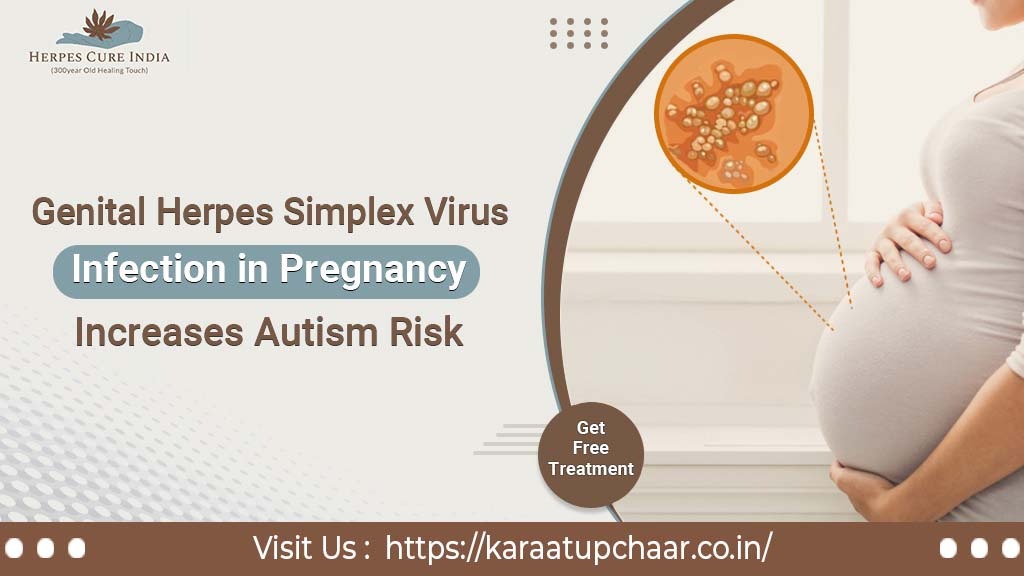
Genital Herpes Simplex Virus in Pregnancy – Increases Autism Risk
It is crucial to treat Genital Herpes Simplex Virus infection during pregnancy. The first pregnancy may increase the risk of transmission to the newborn. Genital Herpes Simplex Virus during pregnancy increases the risk of autism in newborns.
Fortunately, women with Genital Herpes Simplex Virus rarely pass it on to their babies. If you knew you had Genital Herpes Simplex Virus before becoming pregnant, your doctor will monitor you for your condition throughout your pregnancy. If you have an active flare during labor, a C-section may be recommended. However, depending on the individual diagnosis, gynecologists advocate suppressive therapy to reduce the frequency of cesarean deliveries.
Pregnant Women with Genital Herpes Simplex Virus (HSV)
Pregnant women with Genital Herpes Simplex Virus lesions who have demonstrated the first infection in the past will circulate IgG, which can cross the placenta to the fetus. It is very rare for a fetus to become infected with the Genital Herpes Simplex Virus. If genital skin lesions develop during delivery, the risk of infection to the baby is 2-5%.
Conversely, women who periodically reactivate the Herpes Simplex Virus and are asymptomatic at birth have a lower risk (1%) of shedding the virus through vaginal secretions, and thus a lower risk of fetal infection (0.02-0.05%).
Randomized studies have shown that the administration of antiviral drugs starting at the 36th week of gestation reduces the risk of Genital Herpes Simplex Virus transmission without clinically visible lesions and the risk of viral reactivation while reducing the rate of cesarean delivery.
Treatment of Genital Herpes Simplex Virus
Treatment consists of acyclovir 400 mg tablet 3 times a day or acyclovir 200 mg tablet 4 times a day from the 36th week of gestation until delivery. Therefore, viral screening of cervicovaginal secretions is required from the 36th week of gestation. More recent studies also suggest the use of valacyclovir at a dose of 200 mg twice daily.
If there are no clinical herpetic lesions but positive viral cultures at delivery, cesarean delivery is recommended. Conversely, spontaneous labor is indicated if all viral cultures are negative and no clinical lesions are present.
Finally, if labor begins with clinical Genital Herpes Simplex Virus lesions, fetal lung maturity can be assumed, and cesarean delivery should be performed as soon as possible, within 4 to 6 hours after membrane rupture.
Therapy for Genital Herpes Simplex Virus in Pregnancy
Pregnant women with a first clinical episode or relapse of Genital Herpes Simplex Virus can be treated with recommended doses of acyclovir or valacyclovir. Because acyclovir and valacyclovir are not officially approved for the treatment of pregnant women, patients should be advised to give informed consent before administration. However, these treatments did not increase the incidence of fetal malformations, although long-term outcomes have not been assessed.
Treatment with acyclovir and valacyclovir from 36 weeks of gestation until delivery reduces the frequency of clinical manifestations, vertical transmission, and viral elimination during delivery by reducing the cesarean section rate.
Conclusions
Genital Herpes Simplex Virus is a preventable chronic disease. Although most HSV infections are subclinical, clinical diseases may be associated with severe physical and psychosocial morbidity. The clinical presentation is variable; therefore, a suspected diagnosis of Genital Herpes Simplex Virus should be confirmed by laboratory testing. Treatment of Genital Herpes Simplex Virus should be individualized and include counseling about the various natural manifestations of the lesions, education to prevent transmission, the link between HSV and HIV, and discussions to assess the psychosexual impact of the disease. Antiviral therapy is safe and effective for both intermittent and chronic suppression of HSV.
A significant amount of data on the transmission of Genital Herpes Simplex Virus from male to pregnant partner, on the mode of transmission from mother to newborn, typically through maternal first-time infection in the third trimester of pregnancy, has been published in the literature.
Given the growing incidence of Genital Herpes Simplex Virus infection and an apparent increase in the incidence of neonatal herpes, we have focused on preventing maternal-fetal transmission and managing infected pregnant females and neonates. Further research is needed to monitor changing HSV-1 and HSV-2 trends and to develop effective strategies to prevent Genital Herpes Simplex Virus infection. Finally, the main vaccine strategies under development should consider the three critical aspects of herpes viruses: viral latency, immune escape, and high seroprevalence.
Frequently Asked Questions (FAQ) For Genital Herpes Simplex Virus
Q. Is Genital Herpes Simplex Virus Dangerous for Newborn Babies?
This can occur two to 12 days after HSV exposure. If any of these occur, notify your health practitioner immediately. Newborns can become very sick quickly with a high fever and seizures and may also become lethargic (floppy). Genital Herpes Simplex Virus infection in newborns can be very severe and can even cause death. Also, it increases the risk of autism in newborns.
Q. Can Genital Herpes Simplex Virus Affect Pregnancy?
For most people, having Genital Herpes Simplex Virus during pregnancy does not affect their pregnancy or the fetus’s health. However, when a pregnant person has a herpes outbreak shortly before birth, it increases the risk of passing it on to the baby, which can be life-threatening.
Q. How Do You Treat Genital Herpes Simplex Virus When Pregnant?
During pregnancy, no medication should be taken without consulting a doctor. If you are suffering from Genital Herpes Simplex Virus, the herpes cure website will help you, they treat herpes without medicine, and you will get relief within 3 days.
Q. Can a Baby Get Genital Herpes Simplex Virus in the Womb?
Newborns can become infected with the Genital Herpes Simplex Virus during pregnancy, labor, delivery, or after birth. Infants may acquire congenital herpes from a mother with an active, possibly apparent herpes infection at the time of birth.
Q. Is Genital Herpes Simplex Virus Considered High-Risk During Pregnancy?
The risk is extremely small, but Genital Herpes Simplex Virus in pregnancy increases the risk of autism. If a woman with Genital Herpes Simplex Virus has the virus present in the birth canal during delivery, it can be spread to the infant, causing neonatal herpes, a serious and sometimes fatal condition.
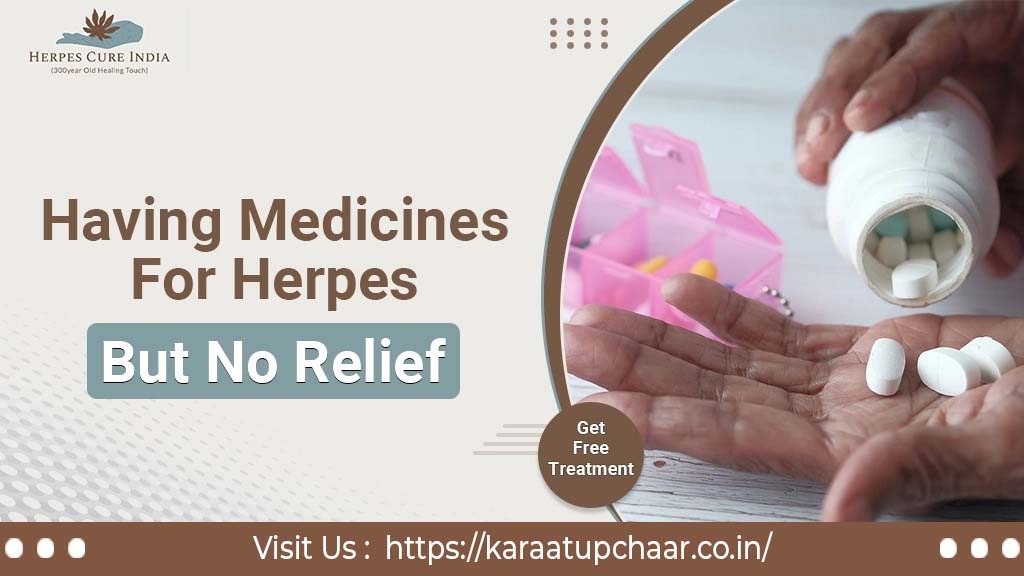
Having Medicines for Herpes But No Relief
Why is it so difficult to find Medicines for Herpes that work?
Due to the nature of the virus, finding effective Medicines for Herpes can be challenging. The HSV infection can stay dormant in a person’s nerve cells for a long time before reactivating and worsening the infection.
Experts believe that even if antiviral therapies eliminate the active aspects of the infection, a small fraction of the virus may hide in nerve cells and remain dormant, allowing the herpes virus to persist in the body.
In order for researchers to create effective Medicines for Herpes, they first need a deeper understanding of the mechanism that enables the virus to remain hidden. Once this mechanism is fully understood, it may be possible to develop treatments that tackle the virus as a whole.
Is there any hope for a treatment that can cure herpes?
The complex shape and behavior of the herpes simplex virus make it difficult to develop a vaccine. The DNA of the herpes virus is more complicated than that of other viruses and, like many cancer cells, it may be able to evade our immune system. While the immune system struggles to stop the virus, Medicines for Herpes have been effective in significantly suppressing outbreaks. There is hope that a cure is on the horizon, especially with advancements like meganucleases transmitted by adeno-associated viruses (AAV), which were successful in eliminating 90% of dormant viral loads in a 2020 study. If applied to humans, this method could significantly reduce viral reactivation, shedding, and the severity of lesions caused by the virus.
Having Medicines for Herpes but no relief in pain?
The vast majority of individuals with HSV do not experience symptoms and may not require treatment, even though there is no cure for any form of the virus.
For those who do experience symptoms, they often clear up on their own after a few weeks. However, there are Medicines for Herpes that can help reduce the frequency and severity of outbreaks, keeping symptoms under control. Additionally, these medicines may reduce the likelihood of transmitting the herpes simplex virus (HSV) to others.
For those seeking alternative treatments, Ayurvedic treatment for Herpes relief, such as herbal oils, may offer some comfort. Creams or ointments that are effective against viruses can also help alleviate itching, stinging, and discomfort.
The following medications are among the antiviral treatments available:
Acyclovir
Famciclovir
Valacyclovir
These Medicines for Herpes can be taken in pill form or administered via injection.
Why is there no relief after the medication?
As mentioned earlier, there is no cure for herpes, so completely removing the virus from the body is not possible with current Medicines for Herpes. During the time the virus remains in the body, it disrupts bodily functions and hampers the immune system. As a result, medications may not fully alleviate the pain caused by the virus.
While medicines may reduce pain during the initial outbreak phase, other symptoms, such as sores and rashes, may persist and require topical treatments like ointment creams. Unfortunately, applying ointments can sometimes increase pain, making it a constant challenge throughout the treatment process.
Home-therapy treatments, such as cold compresses on sores, baking soda paste, warm compresses, and essential oils, may provide temporary relief during the treatment process. However, the pain often returns after some time, making it a persistent issue even with the use of Medicines for Herpes.
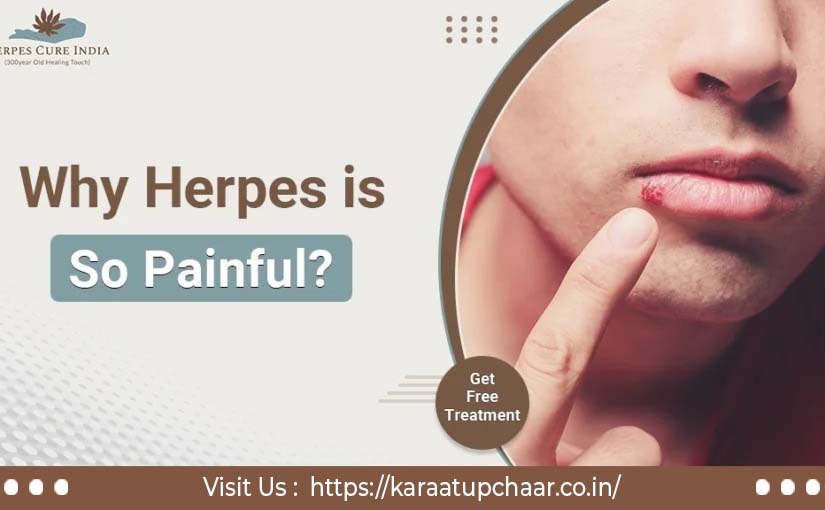
Herpes Cure: Why Herpes Zoster is so Painful?
Acute herpes zoster is often accompanied by discomfort that lasts long after the rash has healed. Patients with herpes zoster experience a range of uncomfortable symptoms. According to current studies, different types of pain vary in their presence, location, length, intensity, and quality; hence, pain must be studied in greater depth. The type and duration of this pain differ, and finding an effective Herpes Cure is crucial for relief. Post-herpetic neuralgia (PHN) is the name for pain that persists after the rash from herpes zoster has gone away.
When compared to other common diseases, the medical repercussions of herpes are disproportionately high. When the infection isn’t treated effectively, several complications arise. The non-adherence to antiviral drug treatment plans recommended by medical professionals also poses a significant problem in finding a lasting Herpes Cure.
One of the well-known effects of herpes is pain in various parts of the body, such as the back and the legs, along with a burning sensation and a desire to scratch. Although there are no definitive studies on the topic, it stands to reason that when the herpes virus is combined with nerve pain, it may cause a wide variety of pain that is not localized to any one area of the body. The herpes simplex virus (HSV-1 or HSV-2) can cause pain, particularly when symptoms flare up or inflammation in the nerves occurs, making the need for an effective Herpes Cure even more pressing.
The most common causes of pain include degenerative disc disease, spondylosis, osteomyelitis, epidural abscess, and malignancy. When left untreated, the inflammation caused by these conditions in the spine and muscles may become chronic. Anti-inflammatory supplements are recommended to help relieve the pain and swelling that come with these conditions, though a complete Herpes Cure remains elusive.
Levels of Pain in the Herpes Cure Process
When infected with the virus, you will experience many stages of pain.
The First Phase
This stage occurs two to eight days after infection. Usually, the infection causes clusters of small, painful blisters. The blister fluid may be transparent or cloudy. Underneath the blisters, the skin will be red. Blisters burst and develop into open sores. The blisters may or may not be noticeable or uncomfortable. Urinating at this time may be painful. While the majority of patients have a painful first infection stage, others do not. They may be oblivious to their condition. The pain experienced at this stage varies greatly from person to person. While pain can be exacerbated in children and the elderly, when the blister occurs at the site and is scratched unknowingly, it can cause severe pain.
Dormant Period
During this phase, there are no outward symptoms such as blisters or lesions. The virus has penetrated your skin and is now infecting your spinal cord nerves. Mostly, this stage doesn’t result in external pain, as the virus remains dormant for a long period before reactivating due to factors like depression, anxiety, HIV/AIDS, or menstruation. This period of dormancy is a significant challenge in finding a comprehensive herpes medication treatment.
The Shedding Phase
The replication of the virus in nerve endings starts during the shedding phase. If these nerve endings are located in or often come into contact with bodily fluids, the virus may enter the body. Saliva, sperm, and genital fluids all fall under this category. Even if there are no signs of illness at this time, the virus might still spread. It’s an indication that the herpes virus is spreading rapidly right now. While the virus is still replicating, the infected person can still experience pain. The pain is not only caused by the herpes virus spreading but also because of a weakened immune system. In addition to the herpes virus, several other factors contribute to the persistence of pain, highlighting the need for a Herpes Cure.
Recurrences of the Herpes Virus
Many individuals experience blisters and sores after the initial herpes outbreak subsides. This is known as a recurrence. Symptoms are often less severe than during the first bout.
Recurrences may be triggered by anxiety, illness, or fatigue. Being exposed to the sun or having your period might also induce a recurrence. If you experience itching, tingling, or discomfort in previously infected areas, you should be on the lookout for a recurrence. This becomes the last stage of pain, although the severity is generally lower than in the first phase. However, the pain can be significantly more intense in the elderly, children, and individuals suffering from other diseases, emphasizing the ongoing need for an effective Herpes Cure.
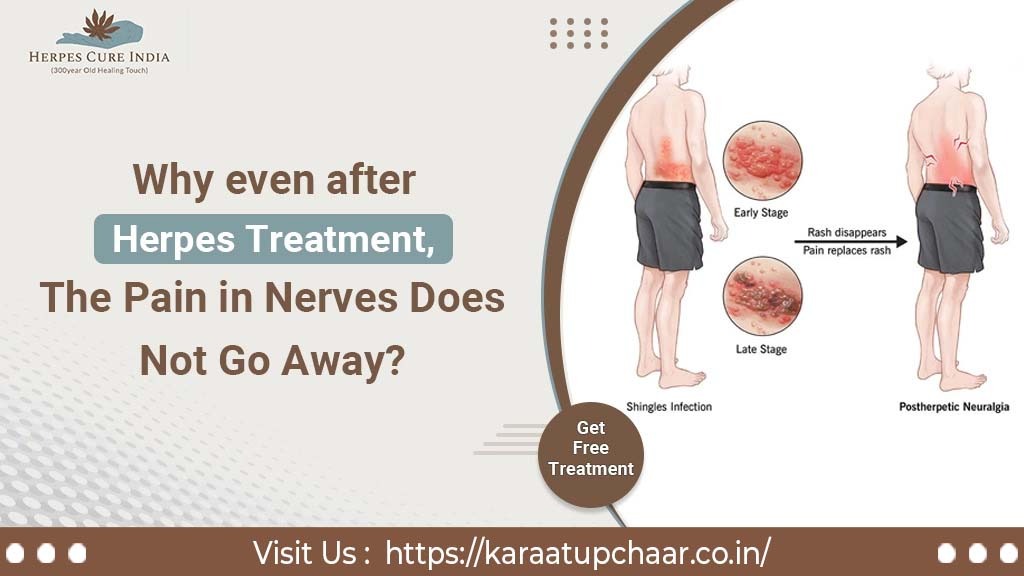
Post Herpes Neuralgia (PHN): Why even after Herpes treatment, the pain in Nerves does not go away?
Herpes Shingles, also known as herpes zoster, can occur at any age. Herpes zoster is an infection caused by the varicella-zoster virus, which reactivates after remaining dormant for a long time, usually following an earlier episode of chickenpox. The varicella-zoster virus typically reappears only once in a person’s life, with only 10% experiencing a recurrence. But what exactly is Post Herpes Neuralgia? In this blog, we discuss Post Herpes Neuralgia.
What is Post Herpes Neuralgia (PHN)?
Shingles is a disease that causes a painful rash with blisters and other symptoms. Usually, the rash appears in bands on one side of your body, often on your trunk (the central core of your body). Blisters form as a result of the rash. Even after the rash or blisters have healed, the pain may persist, a condition known as Post Herpes Neuralgia (PHN).
Post Herpes Neuralgia is the most common and feared complication following herpes zoster. Its definition varies, ranging from pain that persists after the rash has healed to pain that continues 35 days or 5 months after the onset of herpes zoster. Some physicians view herpes zoster-related pain as a continuous condition. Therefore, we recommend using pain duration and pain at specific time points (such as 3.5 months after treatment initiation) as outcomes in clinical studies. Scarring of the dorsal root ganglion and atrophy of the dorsal horn on the affected side are associated with Post Herpes Neuralgia, which develops due to the significant inflammation caused by herpes zoster. Pain and other unpleasant symptoms of Post Herpes Neuralgia, including allodynia (pain in response to generally innocuous stimuli) and hyperalgesia, are caused by these and other peripheral and central nervous system abnormalities.
What does Post Herpes Neuralgia (PHN) make you feel?
You will experience discomfort at the site of the shingles rash. The pain may be intermittent or continuous. Some describe the pain as burning, jabbing, or excruciating, while others (less frequently) report numbness or itching in the affected area. The urge to scratch the affected area can become overwhelming. Soft cotton clothing may help ease the pain by gently rubbing the area, but the satisfaction of scratching won’t entirely go away.
Why, even after Herpes treatment, does the pain in the nerves not go away?
When a person is infected with chickenpox during childhood, the virus may later resurface as Herpes Shingles. In most cases, the virus remains dormant for a long period, but certain conditions (such as depression, a weakened immune system, or old age) can reactivate the dormant virus, causing it to spread. According to research, there is no definitive cure for herpes simplex, but some treatments can ease the pain, whether through vaccines, medications, or Ayurvedic treatments. However, the pain often persists even after Post Herpes Neuralgia treatment due to several factors.
Age: The risk of developing Post Herpes Neuralgia increases with age. When you’re older and contract shingles, you’re more likely to develop PHN and experience more severe pain than if you were younger. Approximately 10 to 15% of shingles patients over the age of 50 will develop PHN, while it rarely affects those under 35. As a person ages, their ability to tolerate pain diminishes, making the pain last longer in older adults.
Weak Immune System: As you age, your immune system weakens, increasing the likelihood of the latent varicella-zoster virus reactivating and causing shingles. Medical conditions such as cancer, chronic infectious diseases (like HIV/AIDS), organ transplantation, and the use of immunosuppressant medications (such as chemotherapy, steroids, or anti-organ rejection medicines) can further weaken the immune system. A compromised immune system reduces the body’s ability to recover, causing the pain from Post Herpes Neuralgia to persist far longer than usual.
Intensity of Shingles: A severe rash increases the chances of developing Post Herpes Neuralgia. Before shingles develop, you may experience painful, itchy, or tingling sensations in the affected area. You are more likely to develop PHN if these symptoms appear in a skin area a few days before the shingles outbreak. When herpes sores appear on more sensitive parts of the body, such as the lips or genital regions, they cause significantly more pain than in less sensitive areas, leading to more severe and prolonged pain.
Delayed Treatment: The chance of developing PHN increases if you wait more than three days after your rash appears to consult a doctor, as this is the window during which antiviral medication is most effective.
Self-help to alleviate the discomfort and irritability of Post Herpetic Neuralgia:
- Cotton or silk clothing is less likely to irritate the skin than other fabrics.
- Use cling film or a plastic wound dressing to protect the injured area.
- Use cold packs, but never apply ice directly to the skin. Some people find that wrapping an ice pack in a towel and placing it on the affected area helps cool the skin.

Causes of Herpes Shingles Virus
The two types of herpes simplex virus (HSV) are HSV-1 and HSV-2. Although HSV-1 may also cause genital herpes, it is more often transmitted via direct oral contact, resulting in oral herpes (characterized by cold sore symptoms). Genital herpes, on the other hand, is an STD caused by herpes simplex virus type 2 (HSV-2).
According to the World Health Organization (WHO):
More than two-thirds (67%) of the world’s population under the age of 50, approximately 3.7 billion people, have HSV-1 infection.
An estimated 491 million people worldwide, or 13%, aged 15–49 are infected with HSV-2.
Herpes symptoms include painful blisters or ulcers that may recur over time. However, the vast majority of HSV infections cause no noticeable signs or symptoms. People with HSV-2 infection are at higher risk of acquiring and transmitting HIV.
What are the Causes of Herpes?
Herpes is caused when one of the herpes simplex virus enters the body through a cut or scrape and moves through the nerves. When this virus becomes active, it may cause sores to appear on the skin.
Herpes viruses can spread through contact with open wounds or cuts in the skin, or by entering the body through the mouth, vagina, penis, or anus.
Cold sores are a common symptom of herpes simplex virus type 1 (HSV-1) infections, which often affect the mouth and lips. Type 1 herpes may be spread through various means, including:
- Intimate actions
- Kissing and oral sex
- Cuddling
- Sharing objects with an infected person (e.g., towels, toothbrushes, or food)
Blisters caused by herpes simplex virus 2 (HSV-2) may appear anywhere on the body, including the mouth, genitalia (vagina, vulva, cervix), penis, scrotum, buttocks, and anus. Sexual contact is the primary transmission route for herpes type 2, including:
- Intercourse
- Oral sex
- Anal sex
- Sexual contact with a person who is herpes-positive
- Exposure to contaminated sperm or cervical secretions
- Asymptomatic Infectious Individuals
Even though herpes is most contagious when open sores, or ulcers, are present, it can still spread even when there are no visible sores, a condition known as asymptomatic shedding. In other words, the virus can spread even if there are no visible signs of it.
Herpes is always contagious, even in the absence of symptoms, because there is no way to know if the virus is shedding without symptoms. Reinfection is a risk if someone touches a sore and then scratches or rubs another area of skin on their body.
Women infected with HSV-2 may transmit the virus to their infants during vaginal birth, with the risk being higher if the mother recently contracted the virus.
Ways Through Which the Dormant Virus Gets Triggered
Many people who are infected with the herpes virus at an early stage, or who are asymptomatic, have a high chance of the virus remaining latent for long periods. A herpes outbreak can be triggered by any of the following causes of herpes:
- An infection, disease, injury, or physical stress
- Persistent emotional stress or distress lasting more than a week
- General illness (ranging from mild illnesses to serious conditions)
- Immunosuppression as a result of conditions such as AIDS
- Use of medications like chemotherapy or steroids
- Fatigue
- Sexual activity or trauma to the affected area
- Menstruation
What are the causes of Herpes Outbreak?
The HSV virus initiates the process of viral replication after entering the nucleus of an infected human cell. Even if your cells have been infected, it is quite unlikely that you will have any symptoms at this stage.
During the first stage of infection, the virus travels through nerve cells to areas known as ganglia, which are nerve-branching regions. The virus will remain dormant at this site, neither reproducing nor showing any signs of its existence during this time.
Sometimes, the dormant virus becomes active again (due to the causes of herpes mentioned above), restarting the replication process. When this happens, the virus travels back to the surface of the skin via the nerve, leading to the death of many infected skin cells. This results in blistering, and when these blisters break open, they turn into sores or ulcers known as cold sores or genital herpes.
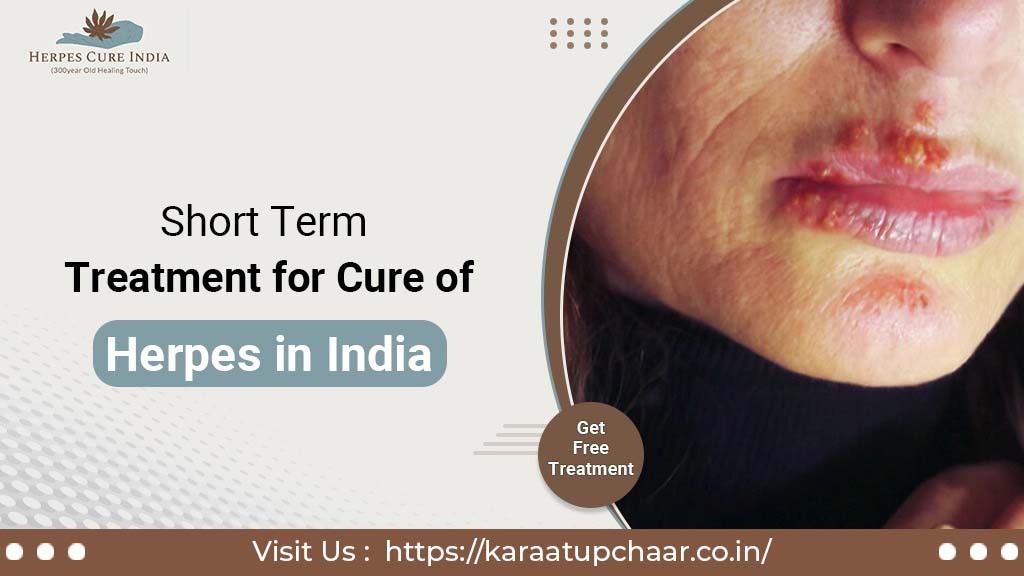
Short Term Treatment for Herpes in India
Herpes is a frequent and contagious infection caused by the herpes simplex virus (HSV). Spread through skin-to-skin contact with infected areas, it often manifests as sores or blisters around the mouth and/or external genitalia. Other symptoms of herpes can include itching, fever, chills, body aches, and painful or difficult urination. In India, the approach to a herpes cure often emphasizes home remedies over medication. These remedies provide short term treatment for herpes in India, offering effective relief for patients. We also provide free herpes treatment in India.
What’s the Best Short Term Treatment for Herpes in India?
Even though there is no permanent cure for herpes, there are numerous methods to manage the symptoms and control the infection. In India, we offer an amazing oil-based treatment for herpes, which makes outbreaks go away faster and prevents them from returning as frequently.
What Do Doctors Say About Short Term Treatment for Herpes in India?
If you’re experiencing an outbreak, your doctor will inform you of the best treatment options for your condition and may provide medication to help heal your sores faster. You can also ease the pain by:
- Taking a warm bath
- Keeping your genital area dry (as moisture prolongs the sores)
- Wearing soft, loose clothing
- Applying an ice pack
- Taking a pain reliever like aspirin
How Can I Get Short Term Treatment for Herpes in India?
If you experience frequent herpes outbreaks, your doctor may recommend taking medication daily—this is known as suppressive therapy. It helps prevent future outbreaks and reduces the likelihood of transmitting herpes to your partners. However, in India, many people prefer home remedies over medication, as the short term treatment for herpes often focuses on natural and holistic approaches.
Whether or not you take herpes medication treatment, it’s important to take care of yourself by eating healthy foods, getting enough sleep, and avoiding stress, which can trigger herpes outbreaks. In India, it is widely believed that home remedies provide effective relief without the need for medication.
How to Prevent Herpes Outbreaks
Other infections, surgery, sexual activity, menstruation, and skin irritations can all trigger a herpes outbreak. Sunburn, injuries to your lips, or other diseases can also cause flare-ups. It’s important to avoid getting sunburned if you have oral herpes.
Herpes outbreaks typically become less frequent and less severe over time, whether or not they are treated. In India, many people find that safe, gentle, and efficient home remedies provide short term treatment for herpes without the adverse effects or drug dependence associated with medication.
Since cold sores and genital herpes are caused by the same virus, physical symptoms such as blisters may appear around the mouth as well as the genitals. Anyone engaging in sexual intercourse with someone known to have herpes should get tested immediately, even if they show no symptoms, due to the nature of the virus. Home remedies can help reduce inflammation, swelling, and itching while waiting for antiviral treatments to take effect.
What are the common Short Term Treatment for Herpes in India?
Several medications are used to treat herpes, all of which are antivirals, such as valacyclovir (Valtrex®), acyclovir (Zovirax®), and famciclovir (Famvir®). However, these medications are often heavy and not always preferred. If you want to treat herpes without medication, visit the Herpes Cure India website, where you can receive free treatment. They prepare herbal oils at home, providing relief from herpes within 3 days.
What is the Latest Short Term Treatment for Herpes in India?
Home remedies are currently the latest approach to treating herpes in India. Although medication is available, it is often avoided due to its strength. Some therapists working with Herpes Cure India provide home remedies, including specially prepared oils that offer relief within 3 days. If you’re seeking free herpes treatment without medication, visit their website for more details.
How Far Away is a Cure for Herpes in India?
Herpes is currently incurable, and it takes time to relieve symptoms. However, by consulting a doctor, you can obtain antiviral medication to reduce the severity of symptoms within a few days. Starting treatment within 24 hours of symptom onset is crucial.
Can Herpes Be Cured in the Future?
Yes, a cure for herpes simplex may be possible in the future. If you receive treatment from Herpes Cure India, you can expect relief within 3 days. Antiviral medications such as acyclovir, famciclovir, and valacyclovir help reduce the severity and frequency of symptoms but cannot cure the infection.
What is the Main Cause of Herpes in India?
You can contract genital herpes after being exposed to HSV-1 or HSV-2. Most people acquire genital herpes from HSV-2 during sexual intercourse. HSV-1, which causes cold sores, can also spread to the genitals through oral sex.
If you want to receive free herpes treatment from us, please visit our website or contact us:
Call Us:
Trinagar Kamal Agarwal (Hargovind Chahcha) – 9013289821
FD 46, Pitampura Prachi Agarwal – 9811718621
Ramprastha, Vaishali, Noida Ravi Agarwal – 9911395464
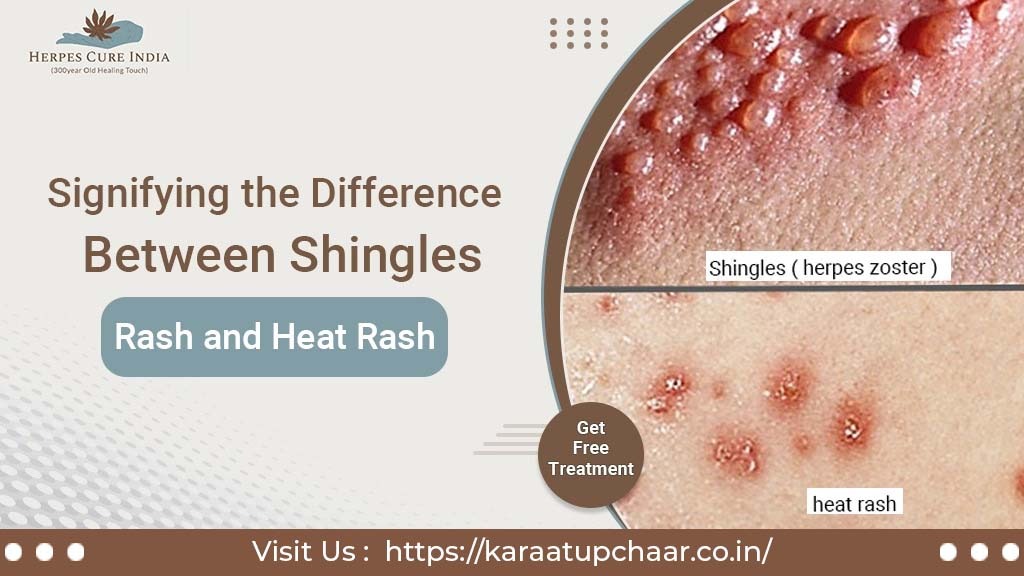
Understanding the Difference between Shingles Rash & Heat Rash
Shingles rash and heat rash are entirely different conditions, but they are often confused with one another. This confusion can lead to delays in diagnosing and treating shingles, allowing the herpes virus to spread further in the body. By the time people realize they are dealing with herpes shingles, it might be too late to prevent complications.
In this blog, we will discuss the difference between Shingles Rash & Heat Rash. But first, let’s clarify what herpes shingles, also known as herpes zoster, is.
What is Herpes Shingles? Understanding the Causes before Exploring the Difference between Shingles Rash & Heat Rash
Herpes infections are caused by the herpes simplex virus (HSV). This infection typically results in blisters or sores around the genitals or mouth, along with other symptoms. There are two types of HSV:
- HSV-1: Causes oral herpes, affecting the skin around the mouth.
- HSV-2: Causes genital herpes and is primarily spread through sexual contact.
Rashes, in general, can be concerning, especially in older adults or community settings where undiagnosed rashes might raise alarms about serious conditions like shingles. It’s important to know the difference between Shingles Rash & Heat Rash to avoid confusion and ensure proper treatment.
Symptoms of Shingles Rash vs. Heat Rash: How to Recognize the Difference
| Shingles Rash | Heat Rash |
| Painful red skin rash with blisters in a localized area, which become cloudy or darkened as they fill with fluid. | Heat rash, also known as prickly heat or miliaria, affects both adults and babies, particularly in hot, humid conditions. |
| Typically occurs as a single, wide stripe on either the left or right side of the body or face. | Heat rash occurs when sweat is trapped under the skin, causing small, blister-like bumps and itching or prickling sensations in the affected area. |
| Two to four days before the rash appears, there may be tingling or localized pain. | Two to four days before the rash appears, there may be itching in the area. |
| Some people develop ongoing nerve pain, lasting months or years, known as Postherpetic Neuralgia (PHN). | Heat rash usually resolves once the skin cools down. Severe cases may require treatment from a healthcare provider. |
Clarifying the Difference between Shingles Rash & Heat Rash
Self-diagnosing a skin condition or making assumptions about a loved one’s health can lead to serious consequences. When dealing with rashes in older adults, it’s easy to confuse the symptoms with other viral diseases like shingles. Understanding the difference between Shingles Rash & Heat Rash is crucial to avoid misdiagnosis.
Recognizing Shingles: The Key to Identifying the Difference between Shingles Rash & Heat Rash
Shingles is a viral infection that can spread from person to person during its vesicular stage. It reactivates in nerve tissue, particularly in individuals at risk, such as those with a latent chickenpox virus or those who have never had chickenpox or the vaccine. Shingles is more common in immunocompromised individuals and people over 65.
The “brand” or “belt” of shingles is the most recognizable sign of an active infection and a critical factor in distinguishing it from heat rash. Shingles usually appear around the waist or chest, creating a girdle-like rash that covers only one side of the midsection.
If you suspect shingles, isolate yourself to prevent spreading the virus and see a doctor for a physical examination. Healthcare providers can quickly identify shingles due to the distinctive blistering rash and will prescribe antiviral medications and recommend home remedies to speed up recovery and reduce pain.
Home Remedies to Help Identify and Treat Shingles Rash & Heat Rash
Herpes Cure offers home remedies specifically for herpes patients, providing free herpes treatment in India that can bring relief in just three days. No heavy medication or vaccination is required—just natural oils that deliver effective results.
Our Medical Expert Board, composed of certified doctors, reviews and vets all information to ensure you are well-informed and confident in your health decisions. We provide free herpes treatment options and empower you with solutions to your most pressing questions, from understanding herpes to managing new diagnoses.
How to Identify Shingles
Shingles is a painful rash that develops on one side of the face or body. The rash consists of blisters that typically scab over in 7 to 10 days and clear up within 2 to 4 weeks. Before the rash appears, people often experience pain, itching, or tingling in the affected area.
Recognizing the Early Signs to Differentiate the Difference between Shingles Rash & Heat Rash
Shingles typically appear as a single stripe of blisters that wraps around the left or right side of the torso. This condition is caused by the varicella-zoster virus—the same virus that causes chickenpox. After you have had chickenpox, the virus remains in your body for life, potentially reactivating as shingles.
What Triggers a Shingles Outbreak?
Shingles occurs when the varicella-zoster virus reactivates in the body after lying dormant. It cannot be contracted from another person who has shingles. Understanding the triggers that lead to an outbreak can help distinguish between shingles and heat rash.
Where Does the Shingles Rash Usually Appear?
The shingles rash typically develops as a stripe of blisters that wraps around either the left or right side of the torso. Sometimes, the shingles rash appears around one eye or on one side of the neck or face, helping to differentiate it from heat rash.
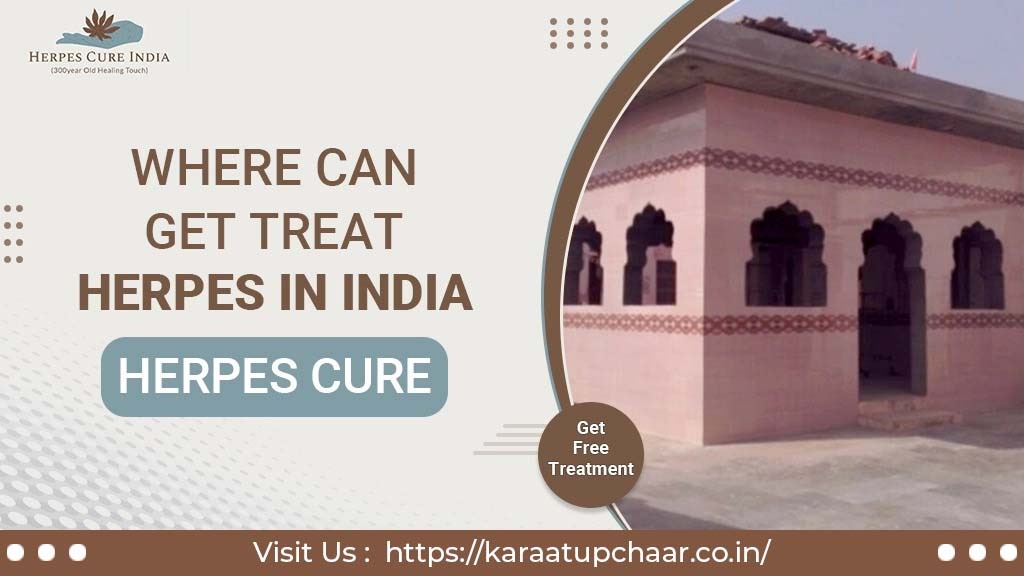
Where Can I Treat Herpes in India – Herpes Cure
How to Treat Herpes in India?
Herpes genitalis, also known as genital herpes, is a sexually transmitted disease caused by the herpes simplex virus (HSV). In India, we offer an amazing oil treatment that can help Treat Herpes in India, manage symptoms, and reduce the frequency and severity of outbreaks.
Our antiviral oils, including acyclovir, valacyclovir, and famciclovir, can help reduce the severity and duration of outbreaks. These oils not only help to treat Herpes in India but also reduce the risk of transmitting the virus to others.
What to Avoid During Treatment to Effectively Treat Herpes in India
When treating herpes genitalis, it’s crucial to avoid certain triggers that can worsen symptoms or cause outbreaks. To effectively Treat Herpes in India, avoid the following:
- Sexual Activity: Avoid sexual intercourse during a herpes outbreak, as it increases the risk of transmitting the virus to your partner.
- Stress: Stress weakens the immune system and can trigger outbreaks. Managing stress through exercise, meditation, and therapy is essential when you want to Treat Herpes in India.
- Alcohol and Drugs: Substance abuse can weaken the immune system, making it harder to manage herpes. It’s important to avoid these during treatment.
- Tight or Irritating Clothing: Wearing loose clothing, especially around the genital area, can help prevent outbreaks and ease symptoms during the treatment.
How to Treat Herpes on the Face in India
Many people are unaware of how to treat Herpes in India when it appears on the face. Often mistaken for heat rash or chickenpox, facial herpes is actually a different type of virus that spreads quickly. According to a recent World Health Organization report, two-thirds of people under the age of 50 have herpes simplex virus 1 (HSV-1), also known as oral herpes.
Treat Herpes in India effectively by recognizing it early and using appropriate treatments. Herpes simplex virus is one of the most common infections worldwide, and it can cause painful blisters or ulcers on the face. Despite the prevalence of HSV-1 and HSV-2, many people lack knowledge about how to Treat Herpes in India.
Important Facts to Know When You Treat Herpes in India
Nearly everyone has been exposed to herpes, and the number of people with genital herpes is increasing. HSV-1, which typically causes cold sores, is now more commonly transmitted through oral sex, leading to genital herpes.
You can Treat Herpes in India with various methods, but awareness and prevention are key. HSV-1 and HSV-2 can both be spread through skin-to-skin contact, even when no symptoms are present. This makes it important for sexually active individuals to get tested and understand how to Treat Herpes in India effectively.
Why It’s Crucial to Treat Herpes in India
Herpes is a virus that spreads through direct contact. In India, it’s important to treat Herpes because the virus can remain dormant and then reactivate, leading to outbreaks. Even if symptoms are mild, the virus can still be transmitted to others.
In particular, the relationship between HSV-2 and HIV highlights the importance of managing herpes. Those with compromised immune systems, such as people living with HIV, may experience more severe HSV symptoms. Using condoms and avoiding contact during outbreaks are essential strategies to Treat Herpes in India and prevent the spread of the virus.
How to Recognize and Treat Herpes in India
Most people with herpes don’t know they have it because they never develop symptoms. However, even without symptoms, the virus can still be transmitted. In India, most doctors won’t test for HSV unless symptoms are present, making it even more important to be proactive in managing and treating herpes.
Honesty with partners, using protection, and avoiding contact during outbreaks are effective ways to Treat Herpes in India and prevent its spread.
If you want to receive free herpes treatment from us, visit our website or contact us:
Call Us:
Raj Dulari (Hargovind Chahcha) – 9954064243
Manoj Agarwal / Sushil Agarwal (Son) – 9435115363 / 9435015362
Kamal Agarwal (Hargovind Chahcha) – 9013289821

